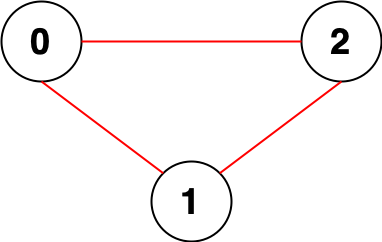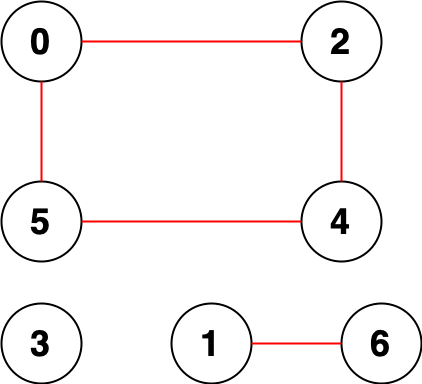Problem
You are given an integer n. There is an undirected graph with n nodes, numbered from 0 to n - 1. You are given a 2D integer array edges where edges[i] = [ai, bi] denotes that there exists an undirected edge connecting nodes ai and bi.
Return **the *number of pairs* of different nodes that are unreachable from each other**.
Example 1:

Input: n = 3, edges = [[0,1],[0,2],[1,2]]
Output: 0
Explanation: There are no pairs of nodes that are unreachable from each other. Therefore, we return 0.
Example 2:

Input: n = 7, edges = [[0,2],[0,5],[2,4],[1,6],[5,4]]
Output: 14
Explanation: There are 14 pairs of nodes that are unreachable from each other:
[[0,1],[0,3],[0,6],[1,2],[1,3],[1,4],[1,5],[2,3],[2,6],[3,4],[3,5],[3,6],[4,6],[5,6]].
Therefore, we return 14.
Constraints:
1 <= n <= 10^50 <= edges.length <= 2 * 10^5edges[i].length == 20 <= ai, bi < nai != biThere are no repeated edges.
Solution (Java)
class Solution {
public long countPairs(int n, int[][] edges) {
DSU d = new DSU(n);
HashMap<Integer, Integer> map = new HashMap<>();
for (int[] e : edges) {
d.union(e[0], e[1]);
}
long ans = 0;
for (int i = 0; i < n; i++) {
int p = d.findParent(i);
int cnt = map.containsKey(p) ? map.get(p) : 0;
ans += i - cnt;
map.put(p, map.getOrDefault(p, 0) + 1);
}
return ans;
}
private static class DSU {
int[] rank;
int[] parent;
DSU(int n) {
rank = new int[n + 1];
parent = new int[n + 1];
for (int i = 1; i <= n; i++) {
parent[i] = i;
}
}
int findParent(int node) {
if (parent[node] == node) {
return node;
}
parent[node] = findParent(parent[node]);
return findParent(parent[node]);
}
boolean union(int x, int y) {
int px = findParent(x);
int py = findParent(y);
if (px == py) {
return false;
}
if (rank[px] > rank[py]) {
parent[py] = px;
} else {
parent[px] = py;
rank[py]++;
}
return true;
}
}
}
Explain:
nope.
Complexity:
- Time complexity : O(n).
- Space complexity : O(n).